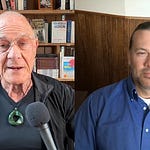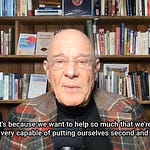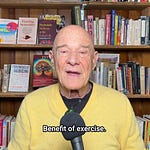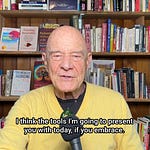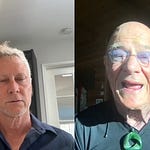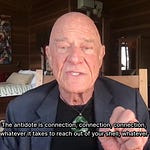Dear friends,
In the wake of a divisive election that has left many communities of color feeling disheartened, I had a profound conversation with Dr. Nicholas Powers about his groundbreaking book, Black Psychedelic Revolution. Our discussion revealed how psychedelics might offer healing pathways for racial trauma and reinvigorate progressive movements at a time when they're desperately needed.
Beyond the celebrity endorsements and exclusive retreats, Powers envisions something more radical: accessible therapeutic spaces where psychedelics could help heal the deep-seated traumas that generations of oppression have created in communities of color. Listen now, or read the summary article below.
Golden light,
Dr. Richard Louis Miller
Links & Resources
Work with Me
After six decades as a practicing psychotherapist, I'm offering limited opportunities to work directly with me. I bring extensive experience addressing anxiety, depression, trauma, relationship challenges, addiction, and psychedelic integration.
My approach focuses on practical mind control techniques that allow you to direct your thoughts and emotions rather than being directed by them. To learn more about working together, contact me here or email DrRichardLMiller@gmail.com with subject line "Contact Request."
Beyond Celebrity Culture: The Promise of Psychedelics for Communities of Color
What happens when a Black professor takes LSD and rides the New York City subway? For Dr. Nicholas Powers, it became one experiential piece in a larger exploration of how psychedelics might create pathways to healing and liberation for communities of color.
Powers' vision is clear: psychedelics aren't just wellness tools for the privileged—they could be revolutionary medicines that help heal the collective trauma of racism while reinvigorating social and political movements.
But right now, as Powers candidly acknowledges, the "Black psychedelic revolution" remains largely a "celebrity fetish." When I asked if the movement is gaining real traction, he responded with unflinching honesty:
"No, no. I mean right now it's a celebrity fetish. Chris Rock can talk about it. Will Smith can talk about it. Angie Yee can talk about doing mushrooms, Mike Tyson... There are probably about 20 to 30, maybe 50 to 60 different retreats that are word of mouth and invite only, led by people of color."
The Vision vs. Reality
Powers' vision extends far beyond celebrity endorsements and exclusive retreats. What he advocates for is nothing short of transformative:
"There is no program yet for mass working class therapy for people of color that is accessible where they live... But that's the vision in the book. That's what has to happen if psychedelics are going to be a real continuous part of a socialist movement."
In our conversation, Powers described how psychedelics have historically played a role in liberating minds from cultural propaganda and systemic oppression. He points to the 1960s counterculture as evidence that these substances can help people "free themselves from the Vietnam War propaganda, from the racism, from the homophobia, the sexism."
Understanding Racial Trauma
One of the most powerful moments in our conversation came when Powers read a passage from his book that illustrates the daily psychological burden of being Black in America:
"For us racial minorities in the United States, the superego is a white superego. We are born into white power structure... It creates a white superego floating like a military satellite spying on you from space. We watch ourselves, we police ourselves. We carefully monitor how we think and act and feel."
This perpetual self-surveillance exacts a profound toll. Powers explained that the hypervigilance required to navigate a society where a single mistake could lead to incarceration creates immense pressure:
"Every single day, I feel like I have to be very, very careful to avoid those handcuffs, to avoid getting trapped in jail, trapped in prison. Trapped in homelessness, trapped in drug use, trapped in joblessness every single day."
This constant pressure eventually becomes unsustainable: "Sometimes people explode. They explode in their private lives, they explode in public. It just pops because you can't be so tightly controlled all your life without at some point exploding."
Beyond the Drug War Narrative
Our conversation also touched on the groundbreaking work of Dr. Carl Hart, whose research has challenged dominant narratives about drug addiction. As I shared with Powers, Hart's replication of the famous "rats choosing cocaine over sex" experiment revealed something profound:
When rats are taken out of isolated, oppressive cage environments and placed in enriched social settings (a "rat park"), they no longer choose drugs compulsively. The implications for human communities are clear—addiction often stems from trauma and social isolation, not simply the chemical properties of substances.
Powers elaborated: "So much of drug addiction is not really about the addictive properties of the drugs themselves, but it's about the trauma and the stress that push people to do drugs in the first place."
Political Backlash and Moving Forward
In the aftermath of the recent election, many in communities of color are experiencing what Powers describes as "mourning" for an idea of America that seems increasingly unattainable. Yet rather than retreat, he advocates for rebuilding from the ground up—through community organizing, mutual aid, and reclaiming public spaces.
"I'm going to organize a rally in the park to start organizing a working class pushback," Powers shared. "When I go out into the park and I offer people free autobiography teaching so they can understand their lives better—that's giving to the community something that can't be taken away from them."
His final message—one that resonated deeply with me—was about the power of writing as a tool for liberation: "Writing cures you from mental slavery... Writing gives you your mind back. Right now our minds are being harvested by phones, by social media... So sitting down or walking and writing gives you your mind back."
Moving Forward Together
As we navigate this challenging political moment, Powers' vision offers both hope and a practical pathway. The intersection of psychedelic healing, community building, and political action could provide a foundation for renewed progressive movements.
But this work must happen in real communities—not just through celebrity endorsements or exclusive retreats. It requires accessible programs that meet people where they are, facilitated by practitioners who understand the unique contours of racial trauma.
In sharing this conversation with you, I'm reminded that healing—both personal and collective—remains possible even in our most difficult moments. As we face a future that feels uncertain, perhaps these ancient medicines, combined with community-based approaches to care, offer one pathway toward a more just and compassionate society.
The Power of Writing as Liberation
Dr. Powers left us with this powerful reminder about the liberatory potential of writing:
"Writing helps you take control of your life. When you put your emotions into words and the words on the page, and then you can see them, you see yourself. Writing cures you from mental slavery... Writing gives you your mind back. It gives you the ability to think and stretch your thoughts out across an expansive time. And that means that your brain can't be harvested for attention cause you're taking that attention back for yourself."
What stories do you need to write to reclaim your mind and experience? How might putting pen to paper help you process the current political moment?
I'd love to hear your thoughts.
Now Available: Psychedelic Medicine at the End of Life
You can now order my latest book, Psychedelic Medicine at the End of Life: Dying Without Fear. This work represents a culmination of my decades-long journey as a clinical psychologist, exploring how psychedelics can transform our approach to death and dying.
The book examines how substances like LSD, MDMA, and psilocybin can be powerful tools in confronting our fears of mortality, ultimately leading to richer, more fulfilling lives. I'm honored to include insights from renowned experts in the field, as well as my own experiences.
Here's what some esteemed colleagues are saying:
James Fadiman, Ph.D., calls it "a deeply uplifting, clear, and compassionate guide to dying and how psychedelics, used correctly, diminish our fears about approaching the door that opens at the end of our life."
Charles S. Grob, M.D., describes it as "a masterful overview of an area of vital importance to our modern world... a valuable resource and contribution to the growing field of psychedelic medicine."
Julie Holland, M.D., notes that "Psychedelics may offer a mini-death rehearsal, offering a glimpse of spiritual oneness, enabling us to be less afraid at the end of our lives."
I hope this book will inspire meaningful conversations and new perspectives on how we approach the end of life.
My Books:
Psychedelic Medicine at the End of Life: Dying Without Fear (release date: November 5)
Freeing Sexuality: Psychologists, Consent Teachers, Polyamory Experts, and Sex Workers Speak Out
Psychedelic Wisdom: The Astonishing Rewards of Mind-Altering Substances
Psychedelic Medicine: The Healing Powers of LSD, MDMA, Psilocybin, and Ayahuasca
Integral Psychedelic Therapy (co-edited with Jason A. Butler & Genesee Herzberg)




